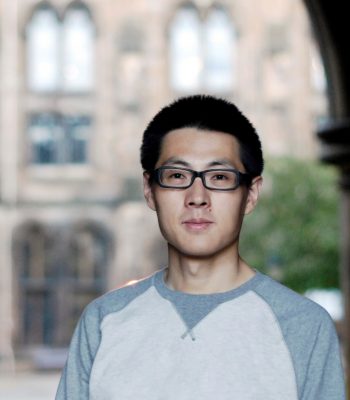
Digital Technology and Society Cluster aims to examine the interaction between emerging technologies and Chinese society. As the modes of power have shifted in the era of algorithms, big data, and social media, it is important to understand the role of these new technologies in Chinese society. The cluster investigates technology both in terms of methodology and subject matter for interdisciplinary research that asks how technological shifts shape Chinese society, and vice versa. The mission of the cluster is to promote a deeper understanding of technology and society through research, teaching, and public events within DKU and beyond. We aim to bring together faculty, students, and policymakers to engage in research, research seminars, speaker series, and other activities.

Fan Liang is an Assistant professor of Media at Duke Kunshan University. His research and teaching explore how new communication technologies construct social and political changes, and how social and political powers shape and regulate the design and operation of such technologies. His research has received recognition and support from British Foreign, Commonwealth and Development Office, American Council of Learned Societies (ACLS), Volkswagen Foundation, International Communication Association, and other institutions. His studies have appeared in peer-reviewed journals including Policy & Internet, Social Media + Society, International Journal of Communication, New Media & Society, Communication Research, and Journal of Communication. Liang has a B.A. in public administration from Shanghai Jiao Tong University, an M.Sc. in political communication from the University of Glasgow, and a Ph.D. in communication from the University of Michigan. Before entering academia, he was a journalist in Chengdu, China.

Charles Chang is an Assistant Professor of Environment and Urban Studies at Duke Kunshan University. His research interest hinges on the intersections between computation and design. With the rise of smartphones and other internet-connected devices, design choices become increasingly data-driven and dependent on information's credibility in the construction of the human habitat. Chang's research focuses on human habitat's design, environmental impact, and information's credibility in the big-data age. His teaching interests at Duke Kunshan include computational social science, digital humanities, and urban informatics. Chang has a B.A. in geography from Beijing Normal University, and a M.Sc. and Ph.D. in environmental studies from the University of Wisconsin, Madison. Before joining Duke Kunshan, he served as the 2016-2017 postdoctoral fellow in Chinese studies at Stanford University and the 2018-2019 postdoctoral associate in Asian studies at Yale University.

Chen Zhang is a Lecturer in Public Policy at Duke Kunshan University. Dr. Chen Zhang is a scholar of urban transformation and planning. Her research investigates both internal and transnational rural-to-urban migration and the urbanization processes through the lens of “urban informality”. Integrating perspectives from political sociology, urban planning, and geography, Zhang’s work probes the emergence, operations, socio-political implications, as well as environmental and behavioral impacts of two types of urban informality: (1) rural-to-urban migrants’ informal practices and (2) state-led informalization. Dr. Zhang’s work is globally comparative with a geographic focus in China and India and draws a blend of qualitative, quantitative, and geospatial methods. This multi-pronged approach has resulted in two book manuscripts and a number of peer-reviewed articles published in journals of Management Studies, Global Environmental Changes, Transportation Letters, and Transport and Land Use, and articles under revision & resubmission or review at Cities, Journal of Planning Literature, and Urban Climate. Dr. Zhang has secured research support from numerous institutions, including the Houtu Foundation for Urban Anthropological Research, joint funds from Wuhan University and Duke University, and the Suzhou Municipal Research Council.

Xin Tong is an Assistant professor of computation and design at Duke Kunshan University. Her research focus is on the broader field of human-computer interaction (HCI), and she is especially interested in designing technology for wellbeing and social good purposes. Her research contributes to the larger understanding of how people with physical and psychological disabilities experience and interact with technology, such as games and virtual reality (VR) environments. She deeply embeds a design-thinking approach, working in partnership with clinicians, caregivers, and patients to solve their problems and reach their goals through a user-centered framework.
With a focus on active learning and critical thinking, Tong has taught courses in HCI, health care technology, multimedia programming, VR, and games. Her goal as a university educator is to create a student-centered learning environment where the students can turn theoretical knowledge into practical skills and, more importantly, make changes in the real world.

Luyao (Sunshine) Zhang is Assistant Professor of Economics and Senior Research Scientist at the Data Science Research Center at Duke Kunshan University (DKU). She has an abiding passion for interdisciplinary collaborations, especially for cutting-edge research of both profound insights and practical impacts, including Computational Economics (Algorithmic Game Theory and Mechanism Design), Artificial Intelligence (Machine Learning, AI Trust, Human-Computer Interaction), Cryptoeconomics (Blockchain for social good, Consensus Algorithms, DeFi), Behavioral Science (Bounded Rationality, Trust, and Cooperation), and Interdisciplinary Big Data (Social Media, Sustainability, and Global Health). Her current research interests are around the application scenarios of "Blockchain +." Her publications appear in economic journals for general interest and beyond, including American Economic Review: Papers and Proceedings, the Review of Economics and Statistics, the World Economy, Nature Scientific Data, Nature Social Indicators Research, ACM CCS, AAAI/ACM AIES, IEEE International Conference on Blockchain Proceedings, Remote Sensing, Journal of Digital Earth, Data and Information Management, etc. She received Ph.D. in Economics at Ohio State University, supported by Presidential Fellowship and NSF dissertation grant. She graduated from Peking University with a B.A. in Economics and a B.S. in Math and Applied Math.